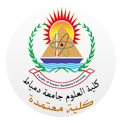كلية العلوم | جامعة دمياط
شارك برأيك
أرشيف الأخبار
المعايير الأكاديمية
Knowledge and Understanding
: The graduates of the microbiology/Chemistry program must be able to demonstrate the knowledge and understanding of
a1.The characteristics of the different states of the matter and elements including
trends in the periodic table and related basic sciences.
a2.The major types of chemical reactions, their mechanisms and kinetics including
catalysis.
a3.The principles and procedures used in chemical analyses as well as in
characterization and structural investigation of chemical compounds particularly
those incorporated into the structure and involved in the functions of
microorganisms.
a4.Chemical nature and behavior of the functional groups in different types of
molecules specially those essential to the microbial life.
a5.The necessary knowledge related to botany, patterns of microbial distribution,
population processes, dynamics, and interception with other life forms.
a6.Nutrients and energy flow through individuals, organisms, populations and
ecosystems related to microbiology.
a7.Major microbial metabolic pathways and their interactions in living organisms.
a8.Structure and functions of microbial cell organelles and bases of cell
differentiation.
a9.Basic techniques of handling, culturing, examination and identification of
selected groups of microorganisms.
a10.Potential usage of some microbial metabolic activities/processes in industries.
a11.Recent concepts in the related areas of microbial genetics/ biotechnology and
chemistry.
a12.Basic laboratory methods used in the study of botany, microbiological and
chemical systems.
a13. Concepts of bio-diversity and maintaining of natural resources.
Intellectual Skills
The graduates of Microbiology/Chemistry program must be able to:
b1. Test, evaluate and criticize an of information in the light of evidence provided by recent
advances in microbiology, botany, chemistry and related sciences.
b2. Analyze, evaluate and, interpret scientific data relevant to the various subjects of chemistry,
microbiology and botany.
b3. Breakdown, synthesizes, reconstruct and reformulate a bulk of information such as pathways for
biosynthesis of biologically active compounds or macromolecules.
b4. Develop lines of argument and appropriate judgment in accordance with scientific theories and
concepts.
b5. Postulate and deduce mechanisms and procedures to handle scientific problems related to recent
advances in microbiology, botany, chemistry and basic science.
b6. Construct several related and integrated information to test, discuss and develop hypotheses.
b7. Link and integrate subject-specific theories, concepts and principles such as relationship between
genes and their products, interactions and modulation of the actions of different types of
physiological regulators in plants and microorganisms.
b8. Analyze and interpret quantitative data in graphs, figures, tables and other sources of
information.
b9. Differentiate between the different genra and species of microorganisms on systematic and
classification bases.
b10- Analyze chemical data to identify and confirm chemical structures as well as to determine
chemical composition of microorganisms.
b11-Propose and conclude mechanisms for physical and chemical processes.
Practical and Professional Skills
The graduates of Microbiology/Chemistry program must be able to:
c1. Plan, design, and conduct investigations using appropriate techniques and write structural
reports on the data in accordance with the standard scientific guide lines.
c2. Use appropriate and contemporary laboratory equipment and tools efficiently in a safe, ethical
and responsible manner to investigate living organisms and microorganisms in multidisplinay
systems.
c3. Solve problems using a range of formats and approaches.
c4. Identify and criticize the different methods used in addressing subject related issues in
microbiology, botany and chemistry and related sciences.
c5. Handle chemical materials safely taking into account their physical and chemical properties to
avoid hazards associated with their use.
c6. Demonstrate sound familiarity with laboratory procedures and techniques used in experimental
applications in microbiology, chemistry and botany and some other displines.
c7. Monitor, by observation and measurement, chemical properties, events or changes followed by
systematic and reliable recording and documentation thereof.
c8. Employ statistical analyses and computational tools to analyze and interpret experimental data in
terms of theories relevant to chemistry and microbiology.
c9. Search and evaluate the validity, credibility, and relevance of literature in a critical thinking
approach.
c10. Consider variations inherent in dealing with biological materials such as sample size, accuracy,
precision and calibration.
c11. Employ different research techniques, information retrieval, modeling, taxonomic keys,
bioassays and tools of molecular biology.
c12. Collect and preserve microbial samples and prepare stained sections for microscopic
examination and identification of different types of cells and tissues.
c13. Carry out experiments on chemistry, plant and microorganisms at a variety of levels of biological
organization (cells and tissues)
General Skills
The graduates of Microbiology/Chemistry program must be able to:
d1. Use information and communication technology effectively.
d2. Identify students’ rights and responsibilities as a member of a team.
d3. Engage in teamwork and manage time effectively.
d4. Think and learn independently to solve problems on scientific basis.
d5. Respect community ethics traditions and moral values.
d6. Develop methods for short and long term self-learning.
d7. Apply the scientific approach, whenever applicable in an effective manner.
d8. Respect the rules of the scientific community, e.g. property and publication rights
d9. Exhibit the sense of beauty and neatness in all statements, actions and community activities with
fellow scientists.

 عربي
عربي
 English
English
 Française
Française
 Español
Español